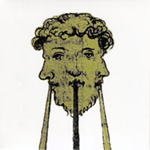|
|
 |
Dusted Reviews
Artist: Bardo Pond + Tom Carter Album: 4/23/03 Label: Three Lobed Review date: Aug. 17, 2004 |

|
|
|
 |
The simple fact that this collaborative venture has been commercial released on a “real” CD attests to its makers recognition that they’ve come up with something special. After all, both the Philadelphian quintet Bardo Pond and San Francisco-based guitarist Tom Carter have issued plenty of music on limited-run CD-Rs. 4/23/03’s five unnamed tracks are the product of a rehearsal-room jam, but they don’t feel tossed-off; rather, their spontaneously generated coherence signals that this is a salutary meeting between complementary minds.
Bardo Pond, whose regular releases on Matador and ATP have mined murky rock riffage for psychedelic gold, have done this sort of thing before. In 1995 and 1997, under the name Hash Jar Tempo, they joined forces with New Zealand-based guitarist Roy Montgomery to make two excellent albums for Drunken Fish that combined Bardo’s lysergic atmospheres with Montgomery’s well-documented flair for cinematic sound painting. The liquid, echoing guitar figures that course through 4/23/03’s second track evoke mental images of primeval forests and dusk-shaded canyons and echo that earlier alliance.
But elsewhere Carter’s personality exerts a powerful undertow that, like his work on his own and with the band Charalambides, plumbs depths of the psyche. The doleful guitar notes that open the album could darken a well-lit room; once the rhythm section kicks in and Isobel Sollenberger’s violin commences sweeping like a reaper’s scythe, the guitarists’ playing tightens and darkens yet further, like melancholy turning to grim resolve. On track three, simmering amp buzz and rhythmically tapped fretboards chart a course from anxiety to reflection, then flare into a brief moment of clarity.
Carter, unlike Montgomery, rarely commands the foreground. It’s often hard to tell his contributions from those of the Pond’s two guitar players, John and Michael Gibbons, especially on the ensuing ghostly 20-minute epic. It begins with a ghostly sequence in which Sollenberger sings barely-heard words through her flute and the guitarists, like hooded acolytes, tug their strings in sullen response. Then the pulse quickens and the music rises, like mist lifting into clouds on a full moon night. The record ends on a drifting note, with detuned guitars drizzling over Clint Takeda’s bass figures like forgotten memories receding into the furthest corners of unconscious memory.
By Bill Meyer
|







